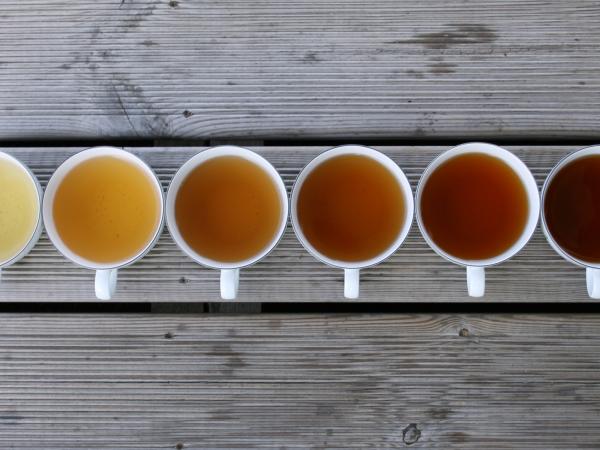All about tea
Caffeine in Tea – Part 2
Caffeine in Tea – Part 2
The stimulating and detoxifying properties of tea were analyzed more than 4000 years ago by Shen Nong. But it was the taste of tea which so captivated the Emperor that he devoted his life to the study of the medicinal virtues found in the camellia sinenis leaf, amongst many other herbs he is credited to have discovered.
Although the various health benefits of tea were recognized by Chinese medicine a very long time ago, it is only recently that modern science has confirmed these results through biochemical analyses.
All teas which come from the camellia sinensis plant (black, green, white, yellow, oolong and pu-erh) contain caffeine, while most herbal teas (chamomile, peppermint, rosebuds, hibiscus) are naturally caffeine-free with just a few exceptions (yerba mate, guayusa and yaupon).
–
Does black tea truly contain the most caffeine?
It is widely believed that black tea contained the most caffeine, green tea contains lower levels of caffeine and that white tea contains the least amount of stimulant due to less processing. But just how accurate are these assumptions?
To determine the validity of this hypotheses, Altitude Tea has drawn upon the findings of peer-reviewed journals and scientific reseach to delve deeper into the subject.
TransBIOTech is a centre for research and biotechnology transfers, and they have analyzed the concentration of certan molecules present in the infusion of more than 30 different teas. Amongst the teas analyzed, it is surprising to find that some black teas did not contain a higher concentration of caffeine than many green (and white!) teas, dispelling the myth of black teas containing the most caffeine. Studies in the Journal of Food Science, as well the the Journal of Analytical Toxicology have also found that there was ‘no observable trend in caffeine concentration due to the variety of tea.’
–
Caffeine content of popular teas
The caffeine of each tea will depend on the temperature of the water as well as infusion time, but for comparison, there is a general rule to the level of caffeine in the following varieties of popular tea when brewed using standardized methods.
Altitude Chai (Assam Black Tea and Fujian Black Tea) – 86 mg per cup
White Peony (Bai Mu Dan White Tea) – 75 mg per cup
Beijing Breakfast (Lapsang Sou Chong Black Tea) – 60mg per cup
Silk & Jade (Tie Guan Yin Oolong) – 37 mg per cup
Dark Dynasty (Ripe Pu-erh Tea) – 15 mg per cup
Buddha’s Brew (Jasmine Green Tea) – 10 mg per cup
Berry Blossom (Goji Berry and Chrysanthemum) – 0 mg per cup
However, as it is difficult to ascertain the exact caffeine measurements in more than 3000 varieties of tea, it is likely that some black teas may have less caffeine than green tea and so on.
It is also worthwhile to note that there are many other factors in tea aside from the caffeine which contribute to the feeling of alertness and energy, for example – the spices in Chai which promote circulation in the system.
There may also be other compounds in tea which offset the sensations of caffeine, for example – the L-Theanine in Cloud & Mist (Gunpowder Green Tea) is a compound known to protect brain and nerve cells, thereby reducing anxiety and promoting a calm and focused state of mind. In this instance, green tea has a competitive edge over coffee.
Teas blended with florals or other herbs may also contain less caffeine per serving, such as Buddha’s Brew (Jasmine Green Tea), in which jasmine flower partially replaces the presence of green tea per serving.
–
Conclusion
As the family of the tea does not necessarily reflect the caffeine content, the abundance of nutrients and polyphenols means that any variety of tea is always a healthy option, provided it is not consumed in excess and does not interfere with sleep (half-life of caffeine is around 4 – 6 hours).
Many of our customers enjoy a strong black in the morning for the sweet and malty flavour (English Breakfast, Altitude Black, Altitude Chai, Beijing Breakfast). An oolong or white is also their perfect complement for a delicate morning tea (Silk & Jade, White Peony, Snow Mint) and followed by a green tea in the afternoon to clear and focus the mind (Altitude Green, Buddha’s Brew, Cloud & Mist). Pu-erh tea (Dark Dynasty) is also very popular after dinner as a a digestive aid and to help burn fat for weight loss. To complete the day, a herbal tea (Berry Blossom, Lustre of Love, Organic Lemongrass, Organic Peppermint) before bedtime becomes a relaxing ritual to promote good sleep and a sense of calm.

